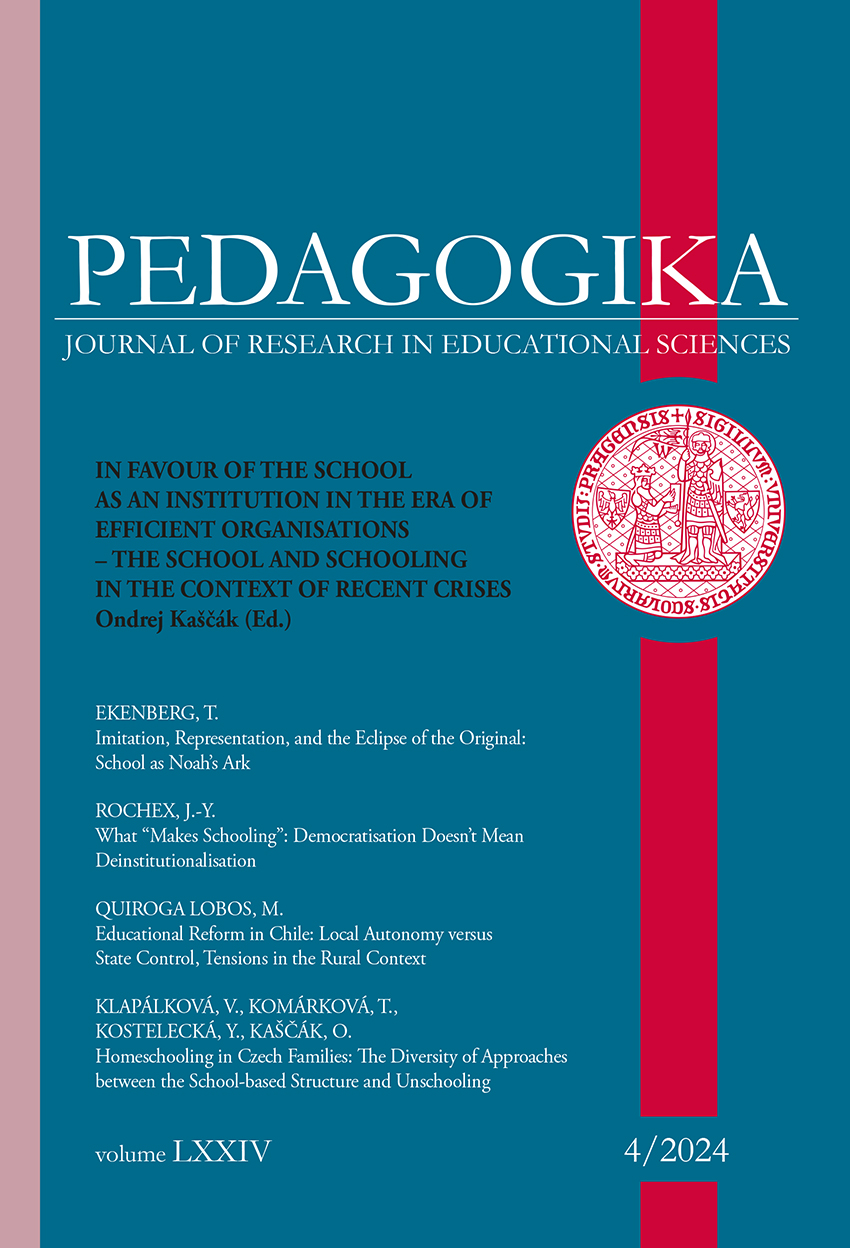What “Makes Schooling”
Democratization doesn’t mean deinstitutionalization
DOI:
https://doi.org/10.14712/23362189.2024.4598Keywords:
school form, grammar of schooling, school as an institution, democratisation, school inequalities, literacy, studyingAbstract
The recent Covid-19 pandemic has both revived and tested the ideologies of unschooling, or the deinstitutionalization of school. It is clear to see that the weakening of the role of schooling has had the effect of increasing educational inequalities and appears to be particularly damaging to students from disadvantaged backgrounds, while families most familiar with the school world have been found to be most able to support their children. These observations should prompt us to rethink the specificity of school as an institution and as a particular form or grammar and to reconsider the anthropological and structural links between school, literacy and study work, the type of knowledge that makes it necessary, and the risk of confusing, on the one hand, the essential democratization of our educational systems and the criticism of their unequal and bureaucratic modes of operation and, on the other, their deinstitutionalization, whether visible or hidden.
References
Ariès, P. (1960). L'enfant et la vie familiale sous l'Ancien Régime. Paris: Plon.
Bartlett, T., & Schugurensky, D. (2020). Deschooling society 50 years later. Revisiting Ivan Illich in the era of COVID-19. Sisyphus, 8(3), 65-84.
Bautier, E. (2011). The analysis of pedagogic discourse as a means of understanding social inequalities in schools. In D. Frandji & P. Vitale (Eds.), Knowledge, Pedagogy and Society. International perspectives on Basil Bernstein's sociology of education (pp. 108-125). London: Routledge.
Bernstein, B. (2000). Pedagogy, symbolic control and identity: theory, research, critique. Lanham: Rowman & Littlefield.
https://doi.org/10.5771/9781461636205
Bonnéry, S., & Douat, E. (2020). L'éducation aux temps du coronavirus. Paris: La Dispute.
Chapoulie, J.-M. (2010). L'École d'État conquiert la France: Deux siècles de politique scolaire. Rennes: Presses universitaires de Rennes.
https://doi.org/10.4000/books.pur.111018
Charlier, J.-É., & Croché, S. (2001). Forme scolaire ou dispositif de production de l'homme. Éducation et Sociétés, 45, 15-35.
https://doi.org/10.3917/es.045.0015
Chartier, R., Compère, M.-M., & Julia, D. (1976). L'éducation en France du XVIe au XVIIIe siècle. Paris: CDU-SEDES.
Chervel, A. (1988). L'histoire des disciplines scolaires. Histoire de l'éducation, 38, 59-119.
https://doi.org/10.3406/hedu.1988.1593
Dubet, F. (2002). Le déclin de l'institution. Paris, Seuil.
https://doi.org/10.4000/questionsdecommunication.7552
Durkheim, E. (1938). L'évolution pédagogique en France. Paris: PUF.
Goody, J. (1977). The domestication of the savage mind. Cambridge University Press.
Goody, J. (2006). La technologie de l'intellect. Pratiques (pp. 131-132), La littératie, autour de Jack Goody (pp. 6-30). Originally published in Goody, J. (1968). Literacy in traditional societies. Cambridge: Cambridge University Press.
https://doi.org/10.3406/prati.2006.2114
Hammerstein, S., König, C., Dreisörner, T., & Frey, A. (2021). Effects of COVID-19-related school closures on student achievement: A systematic review. Frontiers in Psychology, 12: 746289.
https://doi.org/10.3389/fpsyg.2021.746289
PMid:34603162 PMCid:PMC8481663
Hébrard, J. (1988). La scolarisation des savoirs élémentaires à l'époque moderne. Histoire de l'éducation, 38, 7-58.
https://doi.org/10.3406/hedu.1988.1592
Heller, A. (1977). Sociologia de la vida quotidiana. Barcelona: Peninsula.
Johsua, S. (1998). Des "savoirs" et de leurs études: vers un cadre de réflexion pour l'approche didactique. L'Année de la Recherche en Sciences de l'Éducation, 141, 79-97.
Joigneaux C. (2008). Forme scolaire. In A. van Zanten (Ed.), Dictionnaire de l'éducation (347-349). Paris: PUF.
Joigneaux, C. (2009). La construction de l'inégalité scolaire dès l'école maternelle. Revue française de pédagogie, 169, 17-28.
https://doi.org/10.4000/rfp.1301
Karen, D. (2018). The Expansion of the "school form" and deepening inequalities. In J. Mehta & S. Davies (Eds.), Education in a New Society: Renewing the Sociology of Education (pp. 299-308). Chicago - London: Chicago University Press.
Lahire, B. (2008). La forme scolaire dans tous ses états. Revue suisse des sciences de l'éducation, 30(2), 229-258.
https://doi.org/10.24452/sjer.30.2.4790
Lawn, M., & Grosvenor, I. (2005). Materialities of schooling: design, technology, objects, routines. Oxford: Symposium Books.
https://doi.org/10.15730/books.12
Marti, E. (2008). Appropriation précoce des systèmes externes de représentations: apprentissage et développement. In M. Brossard & J. Fijalkow (Eds.), Vygotski et les recherches en éducation et en didactiques (pp. 59-71). Bordeaux: Presses universitaires de Bordeaux.
https://doi.org/10.4000/books.pub.48192
Milner, J.-C. (1983). De l'école. Paris: Seuil.
Moro, C. (2001). La cognition située sous le regard du paradigme historico-culturel vygotskien. Revue suisse des sciences de l'éducation, 23, 493-512.
https://doi.org/10.24452/sjer.23.3.4616
Ricœur, P. (1995). Le Juste, 1. Paris: Esprit.
Ricœur, P. (2001). Le Juste, 2. Paris: Esprit.
Rochex, J.-Y. (2011). The work of Basil Bernstein: a non "sociologistic" and therefore non-deterministic sociology. In D. Frandji & P. Vitale (Eds.), Knowledge, pedagogy and society: International perspectives on Basil Bernstein's sociology of education (pp. 77-93). London: Routledge.
https://doi.org/10.4324/9780203843932-15
Rockwell, E. (1997). Ethnography and the commitment to public schooling. In G. L. Anderson & M. Montero-Sieburth, Educational qualitative research in Latin America: The struggle for a new paradigm (pp. 3-34). New York - London: Garland.
Rockwell, E. (1999). Recovering history in the study of schooling: From the Longue Durée to everyday co-construction. Human Development, 42(3), 113-128.
https://doi.org/10.1159/000022617
Tyack, D., & Tobin, W. (1994). The "grammar" of schooling: Why has it been so hard to change? American Educational Research Journal, 31(3), 453-479.
https://doi.org/10.3102/00028312031003453
Tyack, D., & Cuban, L. (1995). Tinkering toward Utopia: A century of public school reform. Harvard: Harvard University Press.
Vincent, G. (1980). L'école primaire française: Étude sociologique. Lyon: Presses universitaires de Lyon.
https://doi.org/10.4000/books.pul.30073
Vincent, G. (2008). La socialisation démocratique contre la forme scolaire. Éducation et francophonie, 36(2), 47-62.
https://doi.org/10.7202/029479ar
Vincent, G., Courtebras, B., & Reuter, Y. (2012). La forme scolaire: débats et mises au point. Recherches en didactiques, 13, 109-135; 14, 127-143.
https://doi.org/10.3917/rdid.013.0109
Vincent, G., Lahire, B., & Thin, D. (1994). Sur l'histoire et la théorie de la forme scolaire. In G. Vincent (Ed.). L'éducation prisonnière de la forme scolaire? Scolarisation et socialisation dans les sociétés industrielles (11-48). Lyon: Presses universitaires de Lyon.
https://doi.org/10.4000/books.pul.9552
Vygotski, L. S. (1934/1985). Pensée et langage. Paris: Messidor.



